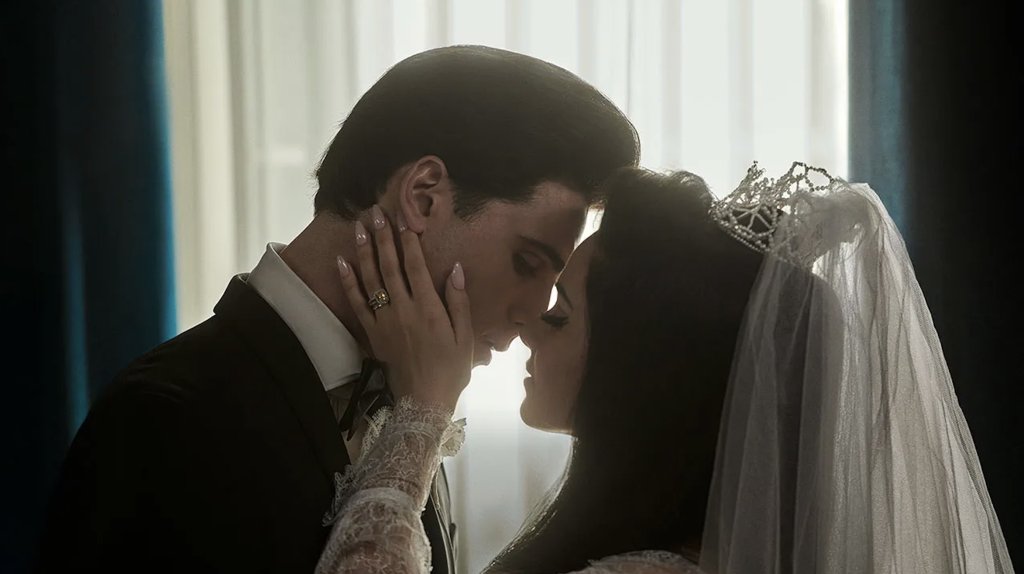The story of Elvis Presley has been told many times. Sofia Coppola made and screened the film Priscilla in Venice from the point of view of the ex-wife, which was a great success at the film festival.
Sofia Coppola was born on 14 May 1971 in New York to a family famous for their love of cinema, the daughter of the famous director Francis Ford Coppola (The Godfather, Apocalypse Now). In this family there was no escaping the cinema. Her father put her in The Godfather for a small part when she was barely a year old, then in The Godfather 2 when she was 3, and when she came of age, she played a major role in the third part of the film. Although she also appeared in a few other films, and was in Star Wars: The Phantom Menace (1999), by her own admission, acting was not Sofia Coppola’s favourite, and her interests tended more towards directing and writing. At the age of 18, she worked with her father on a film called New York Stories, which was divided into three parts, some of which she had already written. It was on the set that she met her future co-star, the young Kirsten Dunst, who was playing her first role. Although she went to art school for a while, Sofia Coppola was not the biggest fan of the education system, preferring to take advantage of the exceptional opportunities to attend many, many film shoots. Sofia Coppola also chose a partner from professional circles: in the early 1990s she met her first husband, director Spike Jonze (Being John Malkovich), to whom she was married until 2003.
In 1998, Sofia Coppola co-wrote and directed the short film Lick the Star, and a year later released her first feature film, The Virgin Suicides. An extraordinary teen film, it tells the story of the collective suicide of Lisbon girls under a strict Catholic upbringing, a personal confession of adolescence and the loss of innocence, set in the not-so-innocent 1970s. The film, written and directed by Sofia Coppola, immediately attracted critical attention. From her very first film, the themes are almost always the same: innocent heroes, strangers in their own world, isolated, whose lives are stuck for some reason. As a woman director, however, she does not only tell stories about women, but does imbue them with a sense of femininity. The big success came with her next film, Lost in Translation, which earned her four Oscar nominations in 2004, including Best Picture and Best Director, with Sofia Coppola eventually emerging as the winner for Best Screenwriter. In the film, two Hollywood favourites, Scarlett Johansson, a young, bored wife, and Bill Murray, a movie star, cross paths in a bar at a luxury hotel in Tokyo. Despite their large age difference, a chance meeting eventually turns into a friendship, and together they wander around Tokyo, discovering a new faith in life’s possibilities. Sofia Coppola’s third feature film, Marie Antoinette, can be seen as a double remake: on the one hand, it re-enacts historical events from a different perspective, and on the other, it places the female character from her earlier films in a new setting. The Marie Antoinette of the House of Habsburg, crowned Queen of France at the age of nineteen, is not an aristocrat deprived of her children, dragged halfway across Paris and then beheaded in the Place de la Révolution, but a teenage girl who has graduated from Versailles instead of the grammar school – from intrigue, decadence, etiquette, love and romance. Our heroine, like Charlotte (Scarlett Johansson), bored in a Tokyo hotel, finds herself in a strange world, whose laws she does not know, and in which, like the wife who looks out of the hotel window at the skyscrapers, she looks down on her empire from above. She was awarded the Golden Lion at the Venice Film Festival for his next film, in which she breaks with the tradition of her earlier films and, besides the heroines, we are given an insight into the life of a Hollywood actor who goes from party to party and photo shoots, bored of his daily changing mistresses and, thanks to his artificially created life, has lost everything he ever was. But in an unexpected turn of events, his daughter is thrown away by her mother, who leaves town, leaving Cleo temporarily in Johnny’s care. Thanks to the little girl, he’s becoming more connected to the real world, bringing new hope into his life and beginning to regain his old self. Somewhere is a quiet, understated, subtle and elegant film with great performances by Stephen Dorff and Elle Fanning. The Beguiled, Coppola’s second novel adaptation after the first film, is a Civil War thriller based on the novel by Thomas Cullinan, also set in a secluded girls’ community, run with maternal rigour by the headmistress of the girls’ school, until male sexuality – in the form of a wounded soldier – intrudes into the repressive environment of the commune and frivolous sexual interest soon turns to bloody tragedy.

After Marie Antoinette, this year the director’s Priscilla, debuting in Venice, is another story of a woman’s self-planned escape from the influence of a man far more dominant than herself. The film, based on Priscilla Presley’s memoir Elvis and Me, follows the famous couple’s relationship from their first meeting when Priscilla Beaulieu was just 14 years old and living on a US Army base in Germany, to the moment, almost a decade and a half later, when Priscilla drove through the gates of Graceland for the last time. Coppola’s story is an even deeper look at their relationship than last year’s Elvis, Baz Luhrmann’s production. Coppola’s Priscilla is a naive teenager who falls into the trap of a glamorous lifestyle. Priscilla is a fascinating and insightful work from the expert on girlhood, and the film and its leads (Cailee Spaeny and Jacob Elordi) were received with rapturous acclaim in Venice.